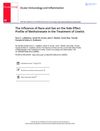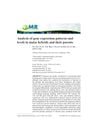 9 citations,
April 2018 in “Journal of trace elements in medicine and biology”
9 citations,
April 2018 in “Journal of trace elements in medicine and biology” Hair analysis can show nutritional status and environmental exposure, with phosphorus being very stable in hair and differences found based on gender and conditions like depression and autism.
 9 citations,
March 2015 in “International reviews of immunology”
9 citations,
March 2015 in “International reviews of immunology” Skin abnormalities can indicate immunodeficiency due to shared origins with the immune system.
[object Object]  9 citations,
December 2013 in “Toxicological Research”
9 citations,
December 2013 in “Toxicological Research” Chamaecyparis obtusa oil may help hair grow similarly to minoxidil by affecting certain growth markers and cell factors.
 8 citations,
December 2020 in “The FASEB Journal”
8 citations,
December 2020 in “The FASEB Journal” Blocking adenosine A2B receptor may prevent or treat hearing loss.
 8 citations,
January 2020 in “Skin Pharmacology and Physiology”
8 citations,
January 2020 in “Skin Pharmacology and Physiology” Caffeine improves hair growth, thickness, and reduces shedding.
 7 citations,
January 2020 in “Scientific Reports”
7 citations,
January 2020 in “Scientific Reports” Rabbit skin analysis showed changes in hair growth and identified miRNAs that may regulate hair follicle development.
 7 citations,
October 2019 in “Clinical, Cosmetic and Investigational Dermatology”
7 citations,
October 2019 in “Clinical, Cosmetic and Investigational Dermatology” Certain gene variations in the Vitamin D receptor may increase the risk of chronic hair loss.
 7 citations,
May 2019 in “Journal of the Formosan Medical Association”
7 citations,
May 2019 in “Journal of the Formosan Medical Association” HSD3B1 gene variant and being overweight linked to hair loss in women with polycystic ovary syndrome.
 7 citations,
January 2018 in “Neurodegenerative Diseases”
7 citations,
January 2018 in “Neurodegenerative Diseases” Researchers found a new ABCD1 gene mutation linked to a rare brain and nerve disorder with unusual brain changes.
 7 citations,
November 2013 in “Pediatric and Developmental Pathology”
7 citations,
November 2013 in “Pediatric and Developmental Pathology” Over half of the children had abnormal hair under a microscope, with many having genetic hair conditions.
 7 citations,
March 2011 in “Hormone and Metabolic Research”
7 citations,
March 2011 in “Hormone and Metabolic Research” Certain gene variations might help protect against insulin resistance and glucose intolerance in people with Polycystic Ovary Syndrome.
 6 citations,
July 2018 in “Scientific Reports”
6 citations,
July 2018 in “Scientific Reports” Methamphetamine affects gene expression in rat whisker follicles, with key genes linked to addiction.
 6 citations,
October 2017
6 citations,
October 2017 Indian Gooseberry has potential for cancer prevention and treatment and promotes hair growth.
 6 citations,
February 2013 in “Medical Oncology”
6 citations,
February 2013 in “Medical Oncology” Certain genetic variants increase the risk of resistance to hormone therapy in prostate cancer patients.
 6 citations,
January 2010 in “Springer eBooks”
6 citations,
January 2010 in “Springer eBooks” SA linked to mitochondrial issues and oxidative stress, while AGA involves disrupted hair growth genes.
 5 citations,
May 2023 in “Frontiers in immunology”
5 citations,
May 2023 in “Frontiers in immunology” Environmental factors like diet and vitamin levels, especially Vitamin D, can affect autoimmune diseases differently, with lifestyle changes potentially improving outcomes.
 5 citations,
January 2021 in “iScience”
5 citations,
January 2021 in “iScience” Using a combination of specific cell cycle regulators is better for safely keeping hair root cells alive indefinitely compared to cancer-related methods.
 5 citations,
June 2020 in “Experimental dermatology”
5 citations,
June 2020 in “Experimental dermatology” Redheaded people may have evolved to efficiently make vitamin D in areas with less sunlight.
 5 citations,
May 2020 in “Diagnostics”
5 citations,
May 2020 in “Diagnostics” Lower zinc levels may predict less effective hair loss treatment.
 5 citations,
August 2018 in “Ocular immunology and inflammation”
5 citations,
August 2018 in “Ocular immunology and inflammation” Methotrexate side effects vary by race and sex.
 5 citations,
January 2015 in “Genetics and Molecular Research”
5 citations,
January 2015 in “Genetics and Molecular Research” Maize hybrids show better early growth due to complex gene interactions from their parent strains.
 5 citations,
November 2008 in “Advances in Dermatology”
5 citations,
November 2008 in “Advances in Dermatology” The review highlights the importance of stem cells in hair health and suggests new treatment strategies for hair loss conditions.
 5 citations,
December 1942 in “Journal of the American Medical Association”
5 citations,
December 1942 in “Journal of the American Medical Association” Choline and biotin are important for liver health and preventing certain deficiencies in animals, and more research is needed to understand their benefits in humans.
 4 citations,
November 2023 in “Frontiers in immunology”
4 citations,
November 2023 in “Frontiers in immunology” New treatments targeting T-cell pathways are needed for better alopecia areata management.
 4 citations,
April 2021 in “Experimental and Molecular Medicine”
4 citations,
April 2021 in “Experimental and Molecular Medicine” The conclusion is that certain genetic factors and blood types may affect COVID-19 severity, but changes in ACE2 and TMPRSS2 genes are not clearly linked to it.
[object Object]  4 citations,
December 2020 in “Mammalian genome”
4 citations,
December 2020 in “Mammalian genome” Harlequin mutant mice have hair loss due to low AIF protein levels and retroviral element activity.
 4 citations,
January 2020 in “Cells”
4 citations,
January 2020 in “Cells” The research found that the gene activity in mouse skin stem cells changes significantly as they age.
 4 citations,
March 2018 in “PloS one”
4 citations,
March 2018 in “PloS one” Men with less sun-sensitive skin have lower PSA levels, while men with more sun-sensitive skin have higher PSA levels.
 4 citations,
September 2016 in “Molecular Medicine Reports”
4 citations,
September 2016 in “Molecular Medicine Reports” Specific genes influence hair and cashmere growth in Laiwu black goats.
 3 citations,
January 2024 in “Signal transduction and targeted therapy”
3 citations,
January 2024 in “Signal transduction and targeted therapy” Lymphatic vessels are essential for health and can be targeted to treat various diseases.





























